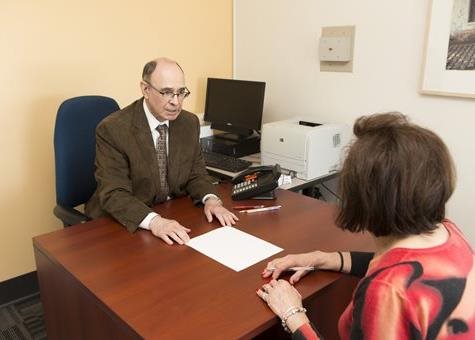 Dr. Freedman evaluating a client
Dr. Freedman evaluating a client
The first thing that will catch your eye in Dr. Morris Freedman’s office is the number of clocks on display. Baycrest’s Head of Neurology has seven clocks in his office (only a small share of his collection), a common gift he receives from friends and colleagues.
The decorative ornaments are fitting for Dr. Freedman, author of
Clock Drawing: A Neuropsychological Analysis and a renowned expert in deciphering a patient’s cognitive impairments and condition through clock drawing analysis.
It was during a behavioural neurology fellowship at the Boston Veterans Administration Medical Center that Dr. Freedman was introduced to how a simple sketch of time captured a wealth of information about a person’s cognitive function.
“Clock drawing is a very quick and easy test to administer and it is a good assessment tool that tells you a lot about a person’s planning, visual-spatial and attention abilities, along with other details,” says Dr. Freedman, who is also a scientist at Baycrest’s Rotman Research Institute and a neurology professor at the University of Toronto.
Upon returning to Toronto, Dr. Freedman continued to pursue ways to improve screening for neurological disorders. The
Toronto Cognitive Assessment (TorCA), developed as part of a Toronto Dementia Research Alliance initiative, is the latest assessment tool Dr. Freedman is working on. The TorCA strives to catch a person’s impending cognitive decline earlier in the disease’s progression. It marries more efficient deployment of healthcare professionals with meaningful data to accelerate dementia research and is becoming the standard screening tool amongst memory clinics across Toronto in a
unique database pilot project.
“We’re in an era where we’re trying to turn back the clock on dementia and move the diagnostic time earlier and earlier,” says Dr. Freedman. “By identifying cognitive decline at the earliest possible stage, we could start treating or even preventing dementia from developing in individuals.”